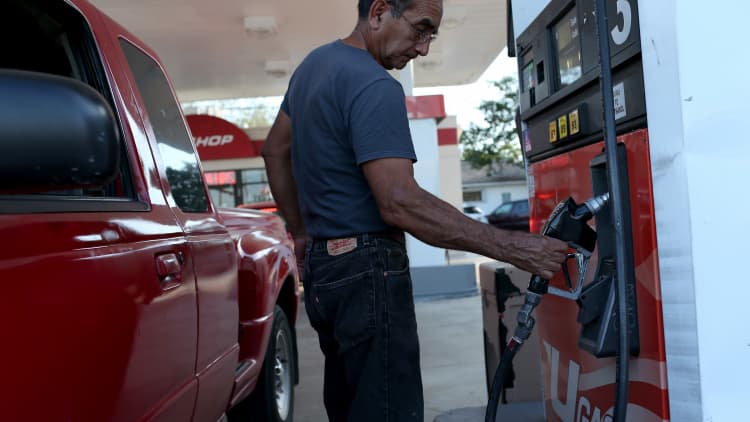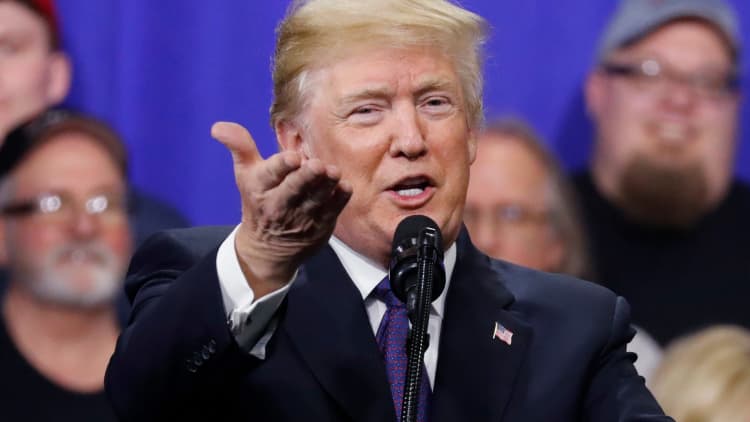
President Donald Trump signaled Wednesday that he's open to raising the federal gasoline tax to pay for infrastructure spending, but hiking the fuel levy for the first time in about 25 years faces significant hurdles on Capitol Hill.
The issue has long been a dicey one in tax policy. Increasing the price of gas at the pump is seen as having a disproportionate effect on middle- and working-class Americans and could be seen as a violation of the pledge many Republicans have taken to oppose tax increases.
But Washington's reluctance to raise federal fees on gasoline and diesel has put the nation's ability to fund infrastructure improvements on shaky ground.
The gas and diesel taxes contribute most of the revenue that funds the Highway Trust Fund, which accounts for the lion's share of federal spending on highways and mass transit. The tax has remained unchanged since 1993 and is not adjusted for inflation, so its purchasing power has diminished as construction costs have risen and fuel efficiency improvements have cut down on the amount of gas Americans consume.
Congress has kept the trust fund solvent by shoring it up with $143 billion in general revenue since 2008, according to the Tax Policy Center. The patch job will allow the fund to cover the spending it has already approved for the next two years, but it will once again face shortfalls in 2021.
"I'm not running for Congress, so I'm in favor of it," said Richard LeFrak, a prominent real estate developer and former infrastructure advisor to Trump.
"In real terms, the gas tax is actually far less than it was in 1993 when they imposed it. And if they did adjust it for inflation or adjust it for the fact that your car is getting much more mileage than it used to, then it actually would produce tens of billions of dollars of annual revenue that could be reinvested back into infrastructure in the country."
The Congressional Budget Office estimates that a 1-cent rise in the tax would increase the trust fund's revenues by $1.5 billion to $1.7 billion.
Trump reportedly supports raising fuel taxes — currently 18.4 cents a gallon for gasoline and 24.4 cents for diesel — by 25 cents. The White House said it does not comment on the president's remarks in closed-door meetings.
In absolute terms, the hike is not too different from past proposals to increase the levy. But Trump reportedly wants to raise it all at once, whereas lawmakers have often proposed a phased-in approach.

In 2014, Sen. Tom Carper, D-Del., advocated raising the tax by 4 cents over four years, and then indexing it to inflation. That same year, Sens. Bob Corker , R-Tenn., and Chris Murphy, D-Conn., proposed a 12-cent hike over two years.
The American Trucking Association is currently proposing a 5-cent per year increase over four years as part of a larger plan to fund infrastructure improvements. The group says the plan would raise $340 billion over 10 years.
"We believe this is the most conservative, immediate and efficient way to put real money on the table," said ATA President and CEO Chris Spear.
Conservative opposition
Support for a tax hike has historically come from the U.S. Chamber of Commerce, labor unions and transportation advocates. Opposition has emanated from conservative and libertarian think tanks, anti-tax groups and allies of GOP mega-donors the Koch brothers.
On the Hill, opposition has not been universal among Republicans, but raising the gas tax is a tougher sell for the GOP because many conservatives have pledged to oppose any tax increases.
"Raising the gas tax has been viewed as politically infeasible for decades, most recently splitting Republican supporters [who] caucus with the Chamber of Commerce in supporting an increase and the Koch brother network opposed," FBR Capital Markets said in a report Thursday.
"However, declining costs per mile and mounting infrastructure investment demands could shift the political calculus."

Rep. Bill Shuster, who chairs the House Transportation and Infrastructure Committee, is reportedly one of the Republicans open to raising the gas tax. On Wednesday, Shuster said he intends to hammer out an infrastructure proposal with Rep. Peter DeFazio, the ranking Democrat on the committee, the Hill reported.
Still, many Republicans are reportedly wary of supporting the tax hike because it could be seen as undercutting the tax cuts they just delivered last year — their sole major legislative achievement since Trump's election.
Strategas Research Partners estimates that a 25-cent gas tax increase, combined with an anticipated 20-cent per gallon increase due to rising fuel prices, could wipe out 60 percent of the consumer savings from tax reform.
"Historically, U.S. presidents' approval ratings are tied to the retail price of gasoline and the President's approval rating is correlated to the number of lost/gained seats in a midterm election," Strategas said in a research note Thurday. "Republicans have gained tremendously in the polls since the enactment of the President's tax cut and higher gasoline prices could cut into those gains."
To be sure, polls have consistently shown for years that a majority of Americans support raising the federal gas tax — provided it pays for infrastructure improvements.
Still, Americans have proven sensitive to higher costs at the pump, and drivers are already seeing prices rise as the oil market recovers from a prolonged downturn, said Tom Kloza, global head of energy strategies at the Oil Price Information Service.
Consumers' tolerance for a hike might also depend on where they live. Drivers in states with high gasoline prices and state fuel taxes like Pennsylvania, California and Washington might be less willing to stomach the extra cost than places with lower burdens like Texas, Oklahoma and Missouri.
In Kloza's view, the proposal is more likely to see the light of day in 2019, when Republicans are beyond midterm elections and oil market conditions could make a fuel tax hike more palatable.
"It's responsible to fund spending. I don't think anyone argues about that, but gasoline and gasoline taxes are kind of a third rail in American politics," Kloza said. "I don't think that President Trump or members of Congress want to be voting on or authorizing or emphasizing a gasoline tax increase this year."
— CNBC's Lori Ann LaRocco contributed reporting to this story.
WATCH: American Trucking Assoc. CEO: Raise the gas tax to 'build America's infrastructure'



